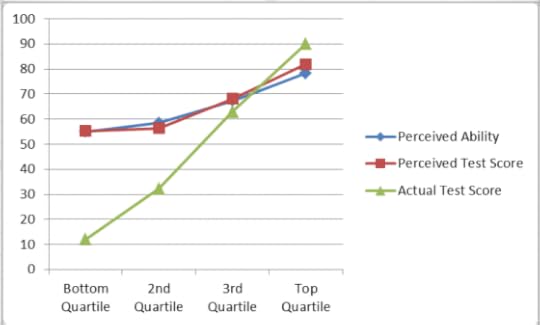The dunning-kruger effect

One of several graphs showing that people who know little (as revealed by tests) still think they know a lot.
“I know one thing: that I know nothing”
—Socrates
“Ignorance more frequently begets confidence than does knowledge”
—Charles Darwin, The Descent of Man
“The trouble with the world is that the stupid are cocksure and the intelligent are full of doubt”
—Bertrand Russell
“The fool doth think he is wise, but the wise man knows himself to be a fool.”
—William Shakespeare, As You Like It
“Welcome to Lake Wobegon, where all the women are strong, all the men are good-looking, and all the children are above average.”
—Garrison Keillor, A Prairie Home Companion
Most of the readers of this blog are familiar with the Dunning-Kruger effect (even if we don’t always know what the name means). Although the idea is an old one, going back at least as far as Socrates and Shakespeare, it was first formally named only 14 years ago by Cornell University psychologists Justin Kruger and David Dunning (not the Brian Dunning of this blog). Their title said it all: “Unskilled and unaware of it: how difficulties in recognizing one’s own incompetence lead to inflated self-assessments.” In other words, ignorant or unskilled people tend to overestimate their level of competence and expertise, while those who are truly expert sometimes underestimate their true level of expertise. Since its proposal and naming, it has become a well-known effect in cognitive psychology, and people have become even more aware of it in recent years due to non-experts trying to shout down people with expertise, or demagogues using the label of “elitism” to push their policies as they ridicule the experts who challenge them.
Since the original paper came out in 1999, there has been a lot of research into why the Dunning-Kruger effect is so common and what drives it. It mostly boils down to a cognitive bias related to confirmation bias (seeing only what we want to see, and ignoring the misses). In the case of the Dunning-Kruger effect, the bias is one where we cannot believe that we are wrong or less intelligent than others, so we have an artificially inflated sense of self-esteem. (And this effect is an ancient human foible, so it can’t be blamed on recent efforts to boost the self-esteem of young people, even at the expense of telling them the truth about their level of competence and intelligence).
Most of us can identify many recent examples of incompetents who don’t recognize their incompetence, often shouting out their inanities and attempting to drown out their expert critics. Some of my favorite examples include:
—Deepak Chopra and other woo-meisters misappropriating the ideas of quantum physics and the Heisenberg uncertainty principle to give their mystical ideas a false scientific veneer. When challenged by a physicist (such as Leonard Mlodinow) who DOES understand quantum physics (as I’ve seen during debates hosted by the Skeptic Society), Chopra weasels out of the fact that physics does not support his woo, and uses rhetorical tricks to cover his ignorance of the subject. Then, in front of the next friendly audience, he goes right back to misleading his followers into thinking he’s an expert on quantum physics.
—Creationists like Duane Gish and their ilk who have absolutely no training or firsthand experience in fossils or paleontology writing whole books about fossils as if they actually had studied them. As I showed in my 2007 book on evolution, when a real paleontologist goes through their writings, it is painfully obvious they don’t know one bone from another, but are just parroting stuff they’ve read in kiddie books, and quote-mining real paleontologists to sound like they don’t support the idea of evolution.
—The follies of the Bush Administration, when they openly mocked the qualified experts who warned them about their disastrous policies (from chasing the non-existent WMDs in Iraq to their economic ideas, to their denial of climate science and evolution). Bush himself bragged about not thinking through things too much or using reason, but making decisions “from the gut”—and spawned a whole industry of experts who revealed that “gut-level” decisions are usually wrong, as well as comedians like Stephen Colbert whose character avoids using logic and reason and data, but makes decisions based on their “truthiness.”
—The purveyors of quack medicines who blather on about the great benefits of their untested snake oil, and then demonize the FDA and the scientists who rigorously test their products to determine if they really work (and vigorously attack doctors like our own Steven Novella or David Gorski or Harriett Hall when these scientists point out that their “medicine” is pure snake oil).
—The various global climate change deniers who have absolutely no training in climate science (including TV weathermen, who do not actually work on climate), who jump on the climate denial bandwagon and nitpick details in the scientific literature that they didn’t work on, and don’t understand enough about to critique it.
—The comically incompetent efforts of Andrew Schlafly (son of right-wing activist Phyllis Schlafly) to rewrite science to fit conservative Christian ideology on his Conservapedia website. As I pointed out in
, this includes his uninformed and ignorant attacks on evolution, climate science, geology, astronomy and cosmology, and other areas of science that creationists try to deny. But his most hilarious efforts are his attempt to deny Einsteinian relativity because he confuses it with the philosophical idea of relativism, because Barack Obama once talked about relativism, and because it’s not in the Bible! Then he shows his complete inability to understand it by bumbling through mathematical equations that prove nothing except that he doesn’t understand physics.
These examples can be multiplied endlessly, so I won’t continue them here, but let the commenters add their own personal favorites.
Donald R. Prothero's Blog
- Donald R. Prothero's profile
- 143 followers



